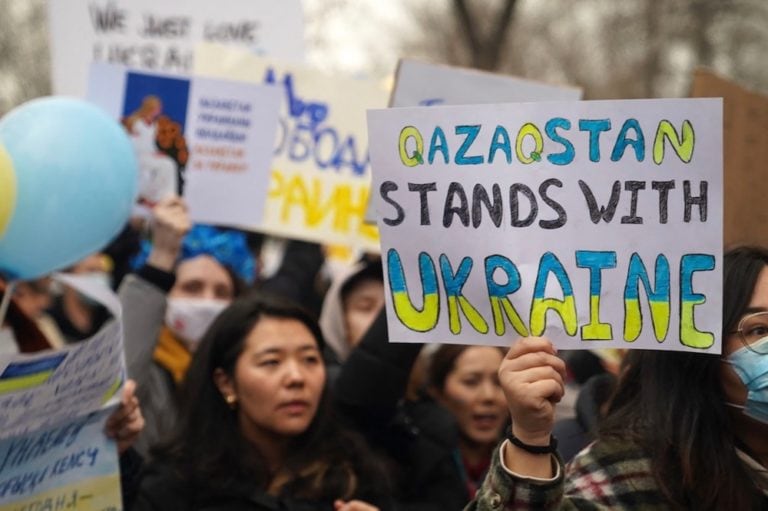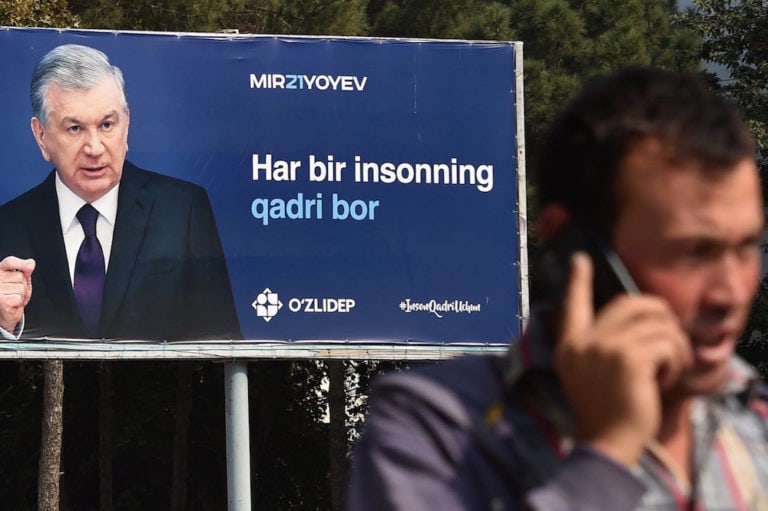In 2006, Alisher Karamatov was arrested, tortured in custody and forced to confess to politically-motivated charges, then sentenced to nine years in jail.
(Human Rights Watch/IFEX) – New York, April 13, 2012 – Uzbek authorities released the rights defender Alisher Karamatov from prison on April 12, 2012, after he served almost two thirds of a 9-year prison sentence, Human Rights Watch said today. Karamatov, an active member of the Human Rights Society of Uzbekistan, who monitored violations of social and economic rights, in particular the rights of farmers and the disabled, was detained in April 2006, prosecuted, and convicted on politically-motivated charges in June 2006.
Karamatov was ill-treated in pre-trial detention and in prison, including being beaten on the soles of his feet, suffocated with a gas mask, and being made to stand for hours outside in freezing temperatures.
“This is a wonderful day for Alisher Karamatov and his family, and his many supporters in the human rights movement,” said Steve Swerdlow, Central Asia researcher at Human Rights Watch. “But the six long years he suffered horribly behind bars simply for defending human rights can never be returned. The Uzbek government must see to it that those that have ill-treated Karamatov are prosecuted and immediately brought to justice.”
At least 10 human rights defenders, and numerous independent journalists and opposition activists remain in prison in Uzbekistan in retaliation for their work or criticism of the government, Human Rights Watch said. In recent months, the Uzbek government has further widened its crackdown on independent civil society, prosecuting rights activists and independent journalists on trumped-up charges, such as fraud or defamation. The government has arbitrarily detained and harassed those at liberty who have attempted peacefully to exercise their right to freedom of assembly.
Karamatov was sentenced on June 15, 2006, to nine years in prison on fabricated extortion charges following a trial that independent observers determined was unfair. His public defender told Human Rights Watch that Karamatov confessed to the charges after being tortured, including being beaten on the soles of his feet and suffocated with a gas mask.
Karamatov’s wife told Human Rights Watch that Karamatov, who was in good health before going to prison, has suffered serious deterioration of his health as a result of his imprisonment. In October 2008, Karamatov was transferred to the prison clinic, where he was diagnosed with an advanced form of tuberculosis in both lungs. Since January 2011, he had been serving his sentence in a prison colony in Karshi.
After his wife visited him in April 2011, she reported that Karamatov had lost weight and was very thin, had developed sores all over his body, and was waking up with traces of blood in his mouth. On April 25, 2011, Karamatov’s wife appealed to the office of the Ombudsman, requesting that Karamatov be released on medical grounds due his “critical health condition.”
Prison officials repeatedly accused Karamatov of violating internal prison rules to keep him from being eligible for amnesty or early release. His alleged violations included saying prayers and wearing a white shirt.”
Previously, on December 30, 2008, when Karamatov had refused to sign a document admitting a breach of the prison regime, prison guards reportedly escorted him outside, took off his hat and sweater, and made him stand in freezing temperatures for nearly four hours to force him to sign the document.
In its increasing crackdown on activists and journalists, Uzbek authorities, in March, deported two well-known international journalists, the BBC’s Natalia Antelava and Viktoriya Ivleva of Russia’s Novaya Gazeta, when they arrived at Tashkent international airport, attempting to visit the country. On February 8, the government-controlled bar association upheld a lower commission’s ruling to disbar one of the country’s leading human rights lawyers, Ruhiddin Komilov.
At the end of January 2012, just days before his 13-year prison sentence was set to expire, Muhammad Bekjanov, former editor of the political opposition newspaper Erk, was given an additional five-year sentence for alleged violations of internal prison rules. Bekjanov has been jailed since 1999, and along with another jailed journalist, Yusuf Ruzimuradov, has been imprisoned longer than any other reporter worldwide, according to the Committee to Protect Journalists.
Prison conditions in Uzbekistan are deplorable and torture and ill-treatment are systematic. In its December 2011 report “’No One Left to Witness’: Torture, the Failure of Habeas Corpus, and the Silencing of Lawyers in Uzbekistan,” Human Rights Watch presented rare first-hand evidence of wide-scale human rights abuses in the isolated country, from which UN human rights experts have been banned for almost a decade.
Human Rights Watch documented cases in which authorities poured boiling water on an activist, hung detainees by their wrists and ankles, subjected them to rape and sexual humiliation, and asphyxiated them with plastic bags and gas masks.
Human rights defenders in prison for no reason other than their legitimate human rights work include: Solijon Abdurakhmanov, Azam Formonov, Nosim Isakov, Gaibullo Jalilov, Rasul Khudainasarov, Ganihon Mamatkhanov, Habibulla Okpulatov, Yuldash Rasulov, Dilmurod Saidov, and Akzam Turgunov. Several are in serious ill-health and at least seven have suffered torture or ill-treatment in prison. Another activist, Jamshid Karimov, was reported to have been released in 2011, but is missing, prompting fears that authorities may have detained him or otherwise restricted his movements.
“We are thrilled that Alisher Karamatov has been freed, but the crackdown on civil society undercuts any claim that Karamatov’s release represents true progress,” Swerdlow said. “The US and EU should make clear that the Uzbek government needs to make deeper changes to improve its human rights record and that continuing to harass activists and journalists will lead to significant policy consequences.”


